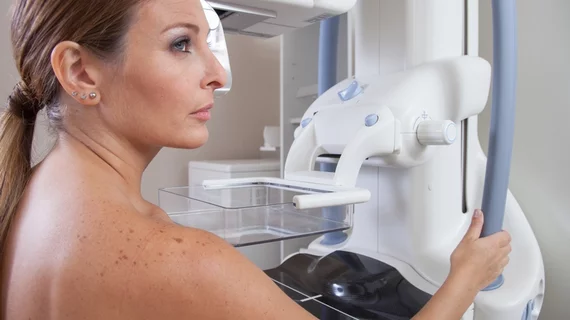Same-day biopsy program can address disparities among breast cancer patients
Implementing a same-day biopsy program can help providers address ongoing disparities in patient care, according to a new study published in the Journal of the American College of Radiology.
A team from Massachusetts General Hospital in Boston conducted the study, noting that numerous disparities are present in breast cancer care in the United States.
“In one study of 4,476 newly diagnosed breast cancers, African American women waited nearly 17 days longer for treatment initiation compared with white women,” wrote lead author Brian N. Dontchos, MD, and colleagues. “In another study, African American women were less likely to receive radiotherapy than white women, and Hispanic women were less likely to receive breast-conserving surgery compared with white women. There are also insurance disparities in breast cancer diagnosis, with one study in 2012 demonstrating that women with private insurance were more likely to receive mammograms at subspecialized breast centers than women without private insurance. Finally, rates of breast-conservation surgery among older women and among women from rural areas have been shown to be lower, highlighting both age and geographic treatment disparities.”
Dontchos et al. established a same-day biopsy program at a single breast imaging center, giving patients the option of an image-guided needle biopsy on the same day suspicious findings were identified. The recommending radiologist, lead mammography technologist and procedure radiologist would all meet to confirm a same-day biopsy was feasible.
To track the effectiveness of the program, the authors explored data from before implementation (Sept. 1, 2016 to March 31, 2017) and after (Sept. 1, 2017 to March 31, 2018). Overall, after a few necessary exclusions, 663 patients were treated prior to implementation and 482 were treated following implementation. Both patient groups had a similar racial makeup and language makeup. Insurance coverage was also similar between the two groups. The percentage of biopsies resulting in breast cancer was 33% for the pre-implementation group and 40.5% for the post-implementation group.
The mean time from examination to biopsy decreased from 9.6 days to 3.6 days following implementation of the same-day biopsy program. The patients receiving a biopsy on the same day of their examination jumped from 11% to 51%. After controlling for age, language and insurance type, nonwhite patients in the pre-implementation cohort waited an average of 2.3 days longer than white patients. After implementation, however, “there was no evidence of a difference in biopsy wait time between nonwhite and white patients.”
On a similar note, after controlling for age, race and language, patients with Medicare in the pre-implementation cohort waited an average of 2.4 days longer than patients with private insurance. After implementation, no such disparity was present.
“Our findings not only support established racial or ethnic disparities in breast cancer diagnosis and treatment, but also support that access-enhancing interventions are effective,” the authors wrote. “Our study adds to the body of knowledge because we have demonstrated a same-day breast biopsy program that eliminates disparities of race or ethnicity, age, and insurance in time from breast biopsy recommendation to biopsy and odds of having a same-day breast biopsy.”

